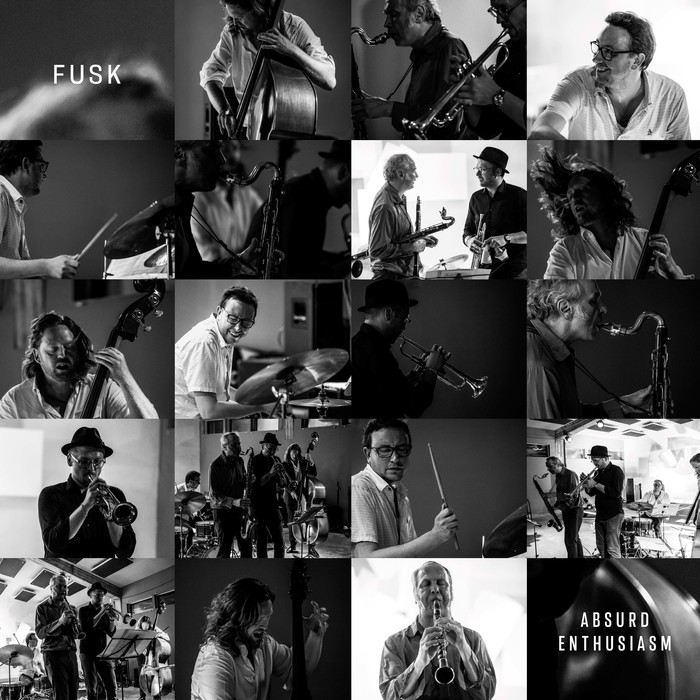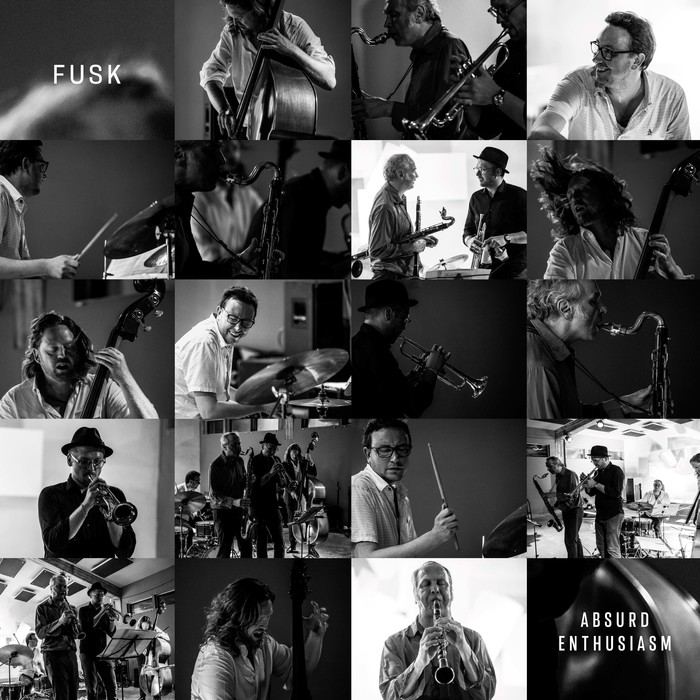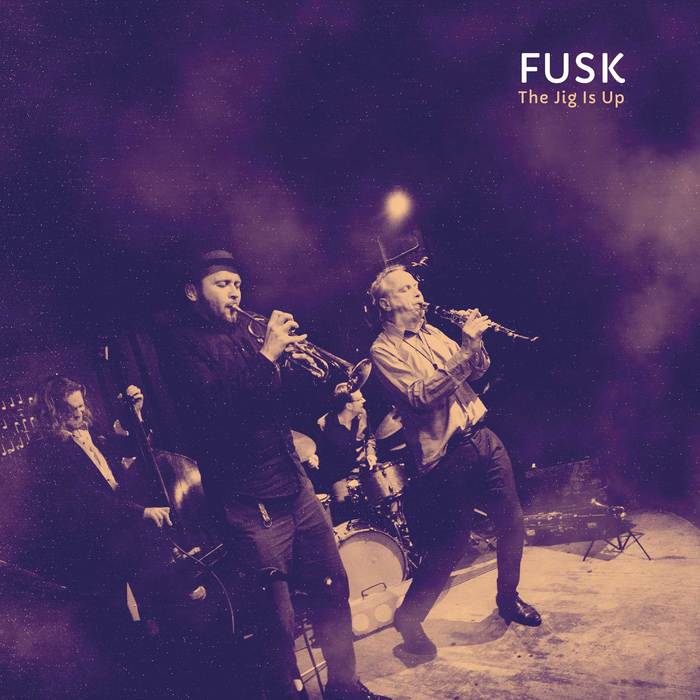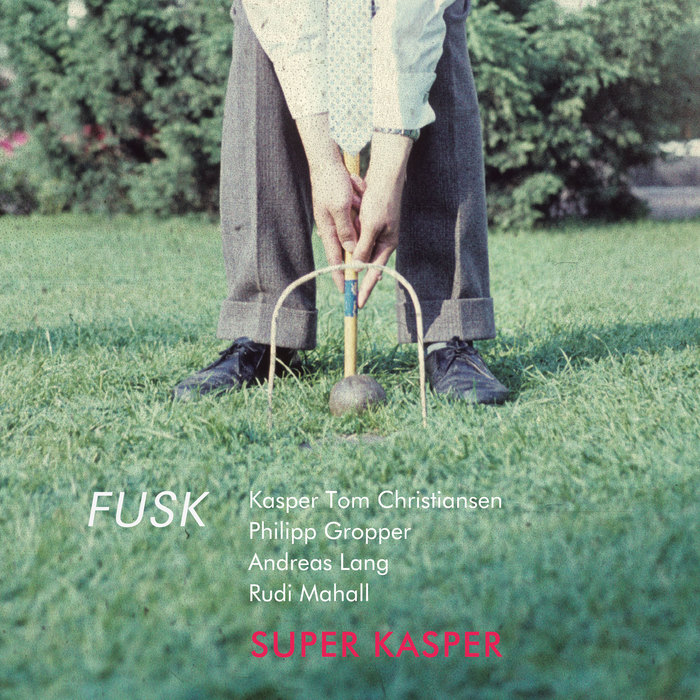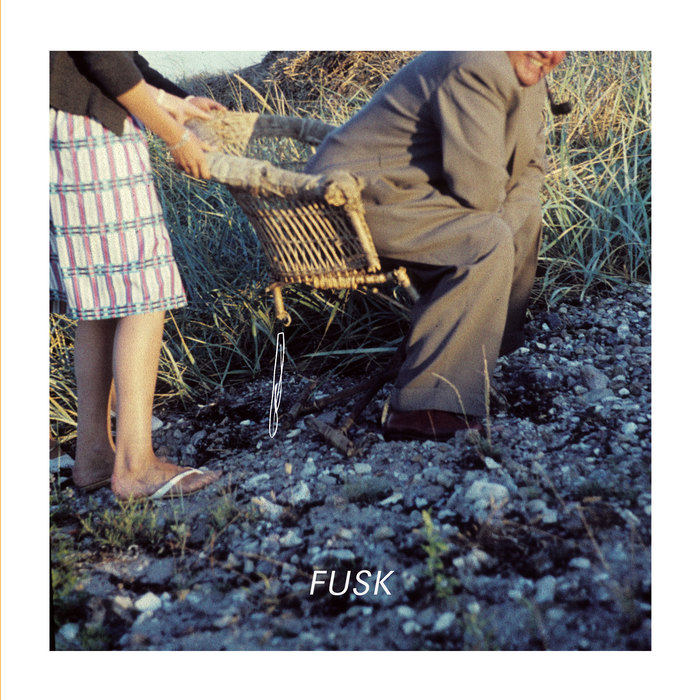The Jig Is Up by FUSK
2018 WhyPlayJazz (WPJ043), CD + MP3 Album Download
Track listing
Line-up
Kasper Tom Christiansen (dr, comp), Tomasz Dąbrowski (tp), Andreas Lang (b), Rudi Mahall (bcl)
Production credits
Recorded, mixed and mastered October 2017 by Tito Knapp at Tito’s Zentrifuge, Berlin, Germany. All compositions by Kasper Tom Christiansen. Produced by Kasper Tom Christiansen for WhyPlayJazz. Design by Travassos. Photo by Kristoffer Juel. With support from Svendborg Musikråd, DJBFA and Koda’s Cultural Funds.
FUSK is 100% contemporary jazz, catapulted forward by the creative ingenuity of the band members; these are players who have something to say! The music is intensive, joyous. It grabs you, as it expands out of its musical roots and takes off and into the open air.
Kasper Tom Christiansen is no purist; instead, he tastefully mixes genres, as much at home with the techniques required in contemporary new music as with the improvisational surprises of free jazz.
FUSK takes up a wide field of play, and this adventurous quartet doesn’t like to be fenced in. It all begins with the members of a band that has been in existence for some ten years. “The Jig Is Up” is FUSK’s fourth album. Trumpet (now with a new band member, the amazing Polish musician, Tomasz Dabrowski), bass clarinet/clarinet (Rudi Mahall), bass (Andreas Lang), and drums: It’s a band that reminds you of such breakthrough bands of the early 1960’s as the classic Ornette Coleman Quartet, the New York Art Quartet, or Archie Shepp’s early quartet with trumpeter Bill Dixon. At first listen they sound a bit retro, indicative of the revolutionary fervor of the time. But straightaway you sense there’s something deeper here, something playful, with an understated humor that transports history into the present.
Despite their complexity, the compositions are far from obtrusive. FUSK evinces an amazing lightness in their play – there’s an edge to the tempos and a synergy between the two horns. That may sound like blue light (high speed) driving, like a club in which you’d love to spend the evening, like big city street scenes, like an enchanted past with imprints in the here and now. It is intensive, joyous music with a melodic incisiveness. It grabs you. Expanding out of its musical roots, it takes off into the open air, as it constructs and deconstructs the musical material in the same breath.
This acoustic band has fun with the album’s feel of freewheeling swing. There’s often a tongue-in-cheek attitude to the music’s mercurial, gripping shifts and turns. It’s fresh music that plays around with the sounds we are used to hearing, as the musicians tip their hats to the past while at the same time blasting through traditional styles.
There’s a balance within the turbulence that oscillates between the compositions and the continual leaps of creative furor. Nothing takes a life of its own here, since everything is dedicated to the service of the musical situation. And there’s the band’s whimsical name, FUSK, which could be translated as “messing around”. With the band’s ironic musical allusions and subtle humor, the name fits. Yet, the irony never degenerates into cheap tricks; there is never a lack of creative ideas.
Reviews
The group's music originated in the style that emerged with Ornette Coleman's piano-less quartet in the late 1950s but with a more European and contemporary sound.
The style is pure and unmatched jazz with equal [...]. They are down to address the roots of jazz, where a collective, organic and wide-ranging expression creates the foundation that FUSK stands on. The strong composite set fits the quartet's slightly dry acoustic sound and melodic freedom. FUSK is an overall whole, where it will not make sense to highlight a musician rather than another. It makes sense to emphasize Kasper Tom as a jazz musician and band leader who, like a organic farmer, grows the soil without the use of pesticides or other environmentally harmful means.
[...] the album shows a pleasant, light-hearted and retro vein, animated by the bass clarinets of the German Rudi Mahall and the Polish trumpet Tomasz Dąbrowski, and supported by the smiling and dynamic Danish rhythm section [...]. In general, it is a good work, whose look at the past sometimes colors the sounds of a nostalgic melancholy.
FUSK has been working now for ten years, refining its witty and inventive aesthetics. Its fourth album, «The Jig Is Up», continues the quartet’s playful-adventurous journey, moving freely between eras and genres throughout the history of jazz, from the dance-based, New Orleans-ian melodies to the most advanced, extended techniques of free improvisers. [...] FUSK’s open yet tight rhythmic interplay and its generous space for personal, even eccentric, ideas and interpretations of the themes may bring to mind the seminal free jazz bands of the early 1960’s as the classic Ornette Coleman Quartet, the New York Art Quartet, or Archie Shepp’s early quartet with trumpeter Bill Dixon. But, today, two generations later, FUSK does not suggests a retro-nostalgic journey into a glorious past, nor it offers a musical revolution against today’s musical conventions. FUSK strength lies in its sober and ironic perspective, often equipped with compassionate humor.
Music of today, which could have been created in the sixties, that is the sound of the music of Fusk. [...] Christiansen is responsible for the fresh, lively compositions that invite to exuberant improvisations. Again, the quartet puts the listener on the wrong track, because how much fun the music radiates, control is always present. No loud extravaganzas, electronic violence or other tyrannies; Fusk is a purely acoustic company, in which the musicality injected, in which technical ingenuity, however, is not an end in itself. On the contrary, it is about lively music that comes to light with a lot of feeling. [...] What The Jig Is Up has to offer: melodic compositions and improvisations, playfulness and fun. This quartet breathes jazz from all pores and this album should appeal to many jazz lovers.
As usual, the music is based on highly complex and yet wonderfully melodic themes, which Christiansen so ably creates, which in turn provide ideal platform for the quartet members to develop their individual and collective statements. [...] The scope of the compositions, and as a result the scope of the music presented on the album is very diverse, which creates an element of tension with the listener not sure as of what to expect next. [...] For an experienced Jazz connoisseur this album is a lecture of Jazz, and especially Free Jazz history, delightfully illustrated by the music. Not surprisingly it is a wonderful piece of music, which should be enjoyed by as many listeners as possible and another milestone in Christiansen´s path, which is one of the most consistently excellent on the burgeoning European Jazz scene. Hats off, again, Maestro!
Danish drummer Kasper Tom Christiansen refers unequivocally to the bubbling period of the early years when the Ornette Coleman Quartet, The New York Art Quartet, or Archie Shepp's quartet with Bill Dixon invented a new way of playing jazz. [...] The leading drummer has cut his tailor-made compositions for his accomplices by adding enough open spaces for their freedom of expression. We enjoy the very natural patina of this music that makes wood, copper, string and skin vibrate with sobriety and authenticity. A music that flows from source and traces a path often chaotic with moments of serenity. If the reference to the past is very sensitive, these musicians remind us that this approach to jazz will always be new. Highly recommended!
The music of “FUSK” is full of contrasts and dynamic stylistic changes. The four interesting and creative avant-garde jazz masters are playing together for a long time now – their collective improvisation is a marvelous synthesis between expressive and passionate improvising, spontaneous musical decisions, original and interesting stylistic waves, sudden turns and colorful contrasts. The main attention is paid to the expressive, free and vivacious improvising and the search of new and unusual ways of playing. Kasper Tom Christiansen's compositions are arranged very inventively and expressively – each musician can explore new ways of playing and show his own style, abilities of playing and interesting playing manners. [...] This album has a bright, innovative and touching sound.

